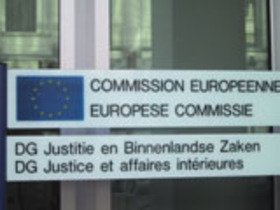Justice and Home Affairs, JHA

- European Commission, DG Justice and Home Affairs (Photo: Daniela Spinant)
JHA is one of the pillars of the European Union. Originally it was based upon intergovernmental co-operation between Member States, but it has partly become subject to supra-national decision making (a result of the Treaty of Amsterdam). Intergovernmental police and judicial co-operation in criminal matters is now dealt with under Title VI of the TEU. It includes co-operation against racism, terrorism, drugs, arms and fraud.
The Community Treaty (TEC) Title IV deals with visas, asylum, immigration and other policies related to the free movement of persons. It provides for supra-national co-operation on border control, refugees and immigration.
Police: The TEU urges closer co-operation between police forces and other authorities, including the use of the common police unit, Europol in The Hague. Police co-operation includes operational co-operation, common actions and co-ordinated investigation.
Judiciary: The closer co-operation between judicial bodies uses the common judicial co-operation unit, Eurojust. Judicial co-operation includes co-ordination between prosecuting authorities, investigations in cross-border crime and implementation of extradition requests.
The Council takes most decisions by qualified majority voting, but sensitive issues require unanimity. Unanimity will continue to be used until 1st May 2004, after which there will be more decisions made by a qualified majority. Denmark, Ireland and the UK have derogations.
The future
The Convention on the Future of Europe proposes that Justice and Home Affairs become a shared competence, with qualified majority voting in the Council and co-decision with the EU Parliament except for judicial and police cooperation and for fixing the volume of immigration.In this way the intergovernmental co-operation will become even more supra-national, with the Commission’s right of initiative and the EU Court to judge.
In certain areas of Justice and Home Affairs the Member States can also put forward proposals for laws. See Art. I-41.
Links
http://www.europa.eu.int/pol/justice/index_en.htmhttp://www.ecdel.org.au/eu_guide/justiceandhomeaffairs.htm
